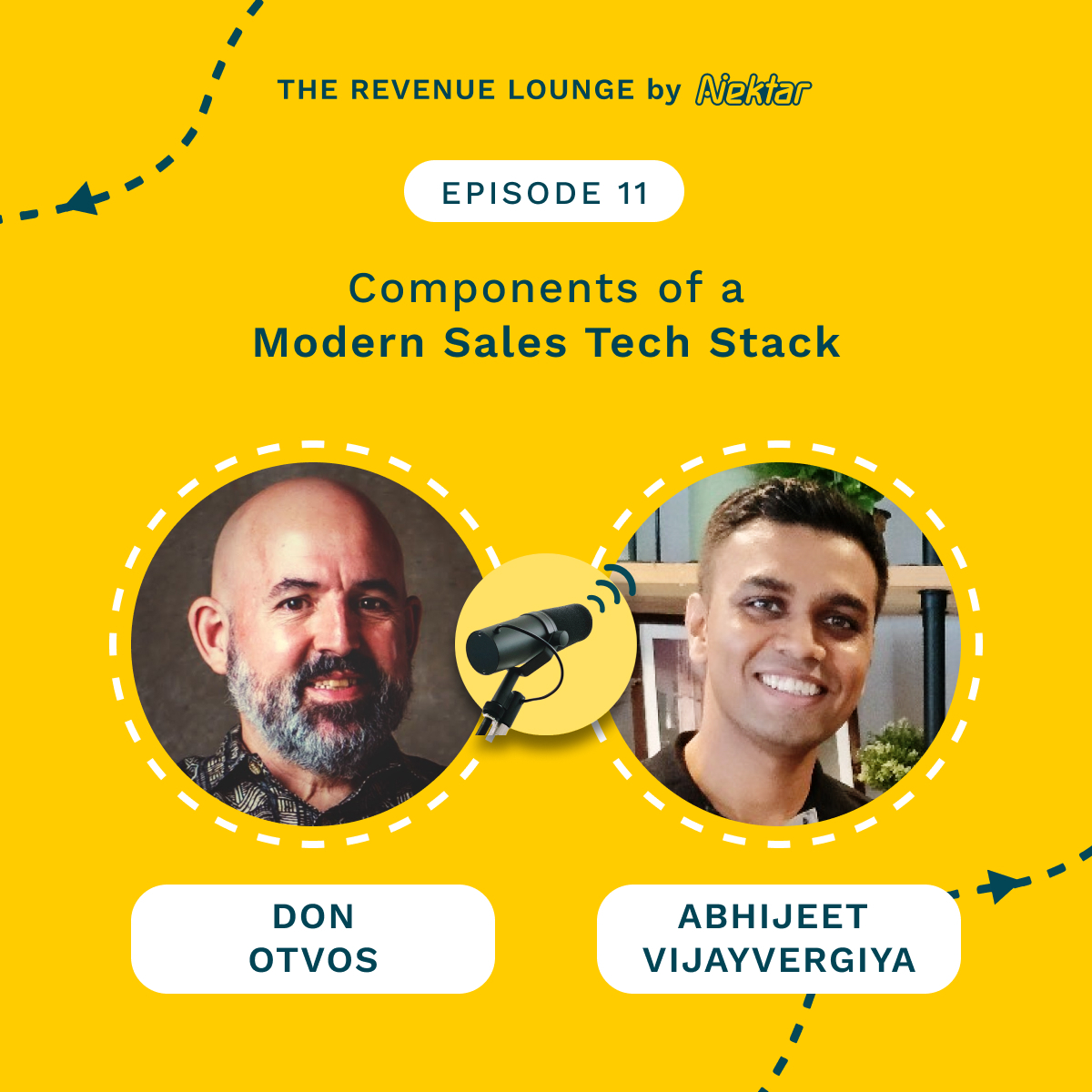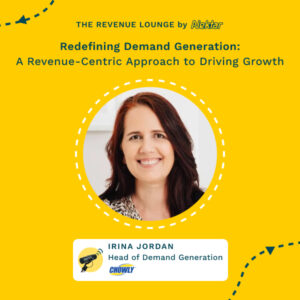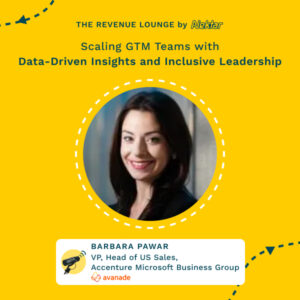Ep #5: Using RevOps to Help Reps Succeed
October 12, 2022
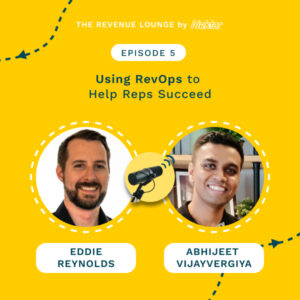
About
The Revenue Lounge
The podcast covers stories from leaders across RevOps, Sales, Customer Success, GTM, Data and Marketing about what drives these functions and what advice they would share with our listeners. With 3 seasons recorded, the podcast currently features 50+ enterprise leaders in the B2B SaaS domain. Tune in to hear from the best in the business
Sales is getting tougher by the day. Reps are finding it hard to close deals in the midst of massive competition, digital buying, and crunched budgets right now due to a downturn. 87% of them are feeling burned out from work (Gartner CSO survey 2022).
Sales quota attainment rates continue to dwindle. This is despite a massive proliferation of sales tools in the market that come with the promise of enabling reps to crush their quotas. RevOps comes in with a lot of hope in simplifying sales for reps.
What are the broad areas in which RevOps enable sales reps to perform better?
Our guest Eddie Reynolds will help us answer some of these questions in this podcast. Counted among the top RevOps leaders, Eddie has spent the last 20 years in sales. He believes that a repeatable, scalable and integrated revenue engine is what separates top performers from the rest.
Let’s hear it from him!

[00:00:00] Hi everyone. Today’s guest is Eddie Reynolds. He’s the CEO at Union Square Consulting. Counted among the top RevOps leaders, Eddie has spent the last 20 years in sales. He believes that a repeatable and scalable integrated revenue engine is what separates top performers from the rest. At Union Square Consulting, he and his team have built a model that helps high growth revenue teams build scalable revenue ops with clear guidance on how to work around systemsm process, enablement insights and strategy.
Hey Eddie, Welcome to The Revenue Lounge, and thanks so much for spending time with us today. It’s great to have you here. So, Eddie, you tell a little bit about yourself, where are you based, and tell us a little bit about the Union Square and your vision with it.
[00:00:44] Well, I think you covered it pretty well. I am based in New York at the current moment, and our team is distributed throughout the United States. In terms of our vision at Union Square Consulting, we want to elevate revenue operations through our work and through our content and doing [00:01:00] things like this.
[00:01:01] Our goal is to help high growth companies, whether they be B2B SAAS companies or other high growth, very ambitious companies, and the professionals that work there to transform their organizations into systematic, process driven, data-driven revenue engines that ultimately deliver the ideal customer experience in the most efficient and effective way possible.
[00:01:22] And because we’re doing this again and again from customer to customer to customer, our goal is to take best practices from every engagement and replicate that across our entire customer base, and then share that freely and openly within the revenue operations community.
[00:01:37] Awesome. I love that. And yeah, I think as you get exposed to different customers of yours, you’d like go through the nuances of different challenges each and every one is facing, and you’re able to help them come across those challenges and that collective experience that you are building as a team would be very powerful as you bring more new clients on board.
[00:01:56] Right. So it’s like, that flywheel of excellence that you’re building at Union [00:02:00] Square. So love what you’re doing and I think it’s great to see your focus on revenue operations. It’s so exciting.
No, I was just going to agree. It is exciting. I mean, I, I’m very passionate about this topic. A big part of revenue operations is setting up tools, but something that I’ve always been so passionate about is all the other areas of revenue operations.
[00:02:18] How do you take these tools and turn them into part of an overall revenue engine that ultimately drives revenue and provides visibility to leadership on what’s working, what’s not, and what direction you’re headed in. And that’s something I’ve been very, very passionate about, probably since the first moment that I ran into Salesforce and even before, and trying to think, okay, as somebody who’s actually selling every day, how can I use this tool?
[00:02:41] How can I use the data in this tool? How can I build a better process so that I can sell more, um, or market? Or serve customers better. Um, and that’s a topic I’m extremely passionate about and it’s really interesting to see how much revenue operations has grown in the last few years, where a number of years [00:03:00] ago you didn’t even hear that term.
[00:03:02] Um, and now you hear it everywhere. And I think it’s a really amazing thing for business in general. Eddie, my next question for you is around your career, you were at Salesforce, you mentioned you were an account executive. So how did Rev op happen for you? How did that career path merge into DevOps op?
[00:03:19] I’d love to know more about your story. Yeah, so I think it started before Salesforce. So I spent the first 10 years of my career mostly in finance. Although I was selling, I was out talking to clients. Um, I was raising capital for private equity and venture capital funds before I joined Salesforce, and I did other things in the financial services industry.
[00:03:38] And in 2010, 2009, 2010, I found myself out of a job, like a lot of people in finance, and I was looking for something and I joined a tech company, a very early stage startup that had built a solution for private equity venture capital on top of Salesforce, and I was their first salesperson. Um, so I came from, you know, larger organizations and all of a sudden, not only am [00:04:00] I selling Salesforce, but I’m also like building my own demos.
[00:04:03] I’m setting up Salesforce myself for my own use. I’m learning from all the folks on our, uh, implementations team, how Salesforce works. But ultimately, I was the only person in sales and also the only person in marketing where I was literally sitting down with the CEO helping to develop all of our marketing assets and generate our inbound leads.
[00:04:19] And so that taught me a lot about revenue operations, even though I didn’t realize it and. When I went back to finance and I started looking for opportunities in New York, I just started casually mentioning, Oh, by the way, I know Salesforce. And before I knew it, everybody I was talking to was saying, Well, can you help us set it up?
[00:04:36] And all of a sudden I was basically, you know, selling and also setting up Salesforce and our marketing engines and all of our other tools across. You know, the companies that I was working for. And so then I eventually started drinking the Kool-Aid and, and really getting into Salesforce and then finally decided to throw my hat in the ring and see what it might be like to work there.
[00:04:56] And so when I worked at Salesforce, that was. [00:05:00] You know, my initial, you know, introduction to really the broad spectrum of everything that is revenue operations. Obviously people think of Salesforce as sales, but at the time that I joined, they had a very, very big push into service and they had just acquired Exact Target and Pardot on the marketing side, and my job was really to go in mostly to.
[00:05:21] Early, later stage startups VC backed here in New York. Uh, my team covered literally every single VC back startup in the New York area between the eight of us. And a lot of the times I was sitting down with the executive teams trying to understand. What are you doing to try to, What are your goals? How are you trying to grow revenue?
[00:05:40] What are your goals across sales, marketing, and service? And how are you trying to integrate that? Um, and even though revenue operations wasn’t a term at the time, we were really trying to drive customers to integrate all of their systems and integrate their thinking across a common set of metrics on how you can drive.
[00:05:57] Marketing and sales and service together. [00:06:00] And so I spent three years talking to these companies and learning from them, some of them that were extremely thoughtful and advanced and would blow my mind with what they were doing and others that were very much not, and going in and whiteboarding all of this stuff out and outlining their path to get to the next milestone that they wanted to reach.
[00:06:19] That was my favorite part of the job. I like closing deals. I like, you know, meeting new people. I like lots of aspects of sales, but I found that the consulting aspect of the job is where I really enjoyed my time the most. And. I worked with a lot of Salesforce consultants where we would refer our customers to them to implement Salesforce.
[00:06:38] And I think one of the things that I found frustrating is a lot of them were very, very focused on tools. All of them in fact. And so I would work so hard to get a strategic meeting with the entire executive team at a series C series D series E startup, and. They would be talking, you know, about Jira integrations and workflows, five minutes into an executive level meeting.[00:07:00]
[00:07:00] And I found that incredibly frustrating. I thought, this isn’t why we’re here. We’ll get to the tools, but the tools are a means to an end. They’re not the end itself. The way that we get to our goals is through strategy and process and people, and then ultimately systems to support that. And so when I left Salesforce to start this company, I really wanted to hire consultants that were more thoughtful.
[00:07:23] Uh, had more business acumen and that evolved as did the industry over the last six years into revenue operations, where we want to be part of the strategy and the process and the analytics, and not just setting up tools, although we do set up a lot of tools. Yeah, I’m sure you do. But that’s very interesting and I think you’ve been an operator yourself.
[00:07:42] You’ve sold right? You’ve been into the weeds, so you understand the. Quite well compared to a lot of folks who are not being into sales, and they’re all into rev ops, or they’re doing rev ops consulting because being an A, you have that unique experience and you can appreciate. [00:08:00] What the user goes through, and you can actually bring that into practice.
[00:08:03] I was just going to say, I think that that is a big piece of what’s, maybe not what’s missing, but challenges that folks have, and I have no issue with somebody entering rev op that comes from an, a technical background or an admin background, or a finance background or just starts in, in operations. I have no issue with that.
[00:08:19] But one challenge is, is those folks really need to sit down with the sales people, sit down with the marketers. Sit down with people and customer success and understand what they do every day and what motivates them and the challenges they face. Because if you’re working in a silo and you’re just looking at data and tools, they’re going to miss a lot of the nuance of what makes jobs like sales so challenging, and you’re not going to understand why.
[00:08:44] You get resistance to trying new tools. Why you get resistance to adoption, why things like data entry are difficult if you haven’t been in their shoes, or at least sat down with them to try to understand the challenges in their job. Definitely, definitely. I think the next thing I want to know more from you [00:09:00] is as a rep, I think the most important thing is quota, right?
[00:09:03] I think more than half or at least half of the, the salary is linked to variable or commissions that are all quota. So when you’re looking at a, and you are an A yourselves, you understand how COTA is important for sales people, and Rev ops plays a very important role, right? I mean, they can really create the right process, systems, tools, as well as enablement in some cases to get sales people to become more successful.
[00:09:29] Now that you’ve been an A, and you’re also into rev op consulting through your company, what’s your take on sales quota attainment in general? Right. There’s only reports out there which talk about the quota attainment dropping year up after year. I think another reports I was reading the other day, the sales quota attainment has fallen by 45% in the last five years, whereas the proliferation of tools, if you look at it, they’ve grown like seven x from, uh, the number of tools that existed in anybody’s text stack just six, seven years back.
[00:09:58] And these two don’t seem [00:10:00] to correlate, right? When you’re like so many tools out there to help the. At the same time, quota are like abysmally low. So I’d love to hear your perspective on what’s going wrong and more so. A balance perspective of you being an A before and now you being into Rev op. So what, what’s your take on what’s going wrong there?
[00:10:19] Well, in regards to the tools, they’re only as good as the team using them. You know, I, you can give me Tiger Woods set of golf clubs and since I don’t play golf, I’m not going to perform very well. And he could go buy a pair of, uh, a set of golf clubs at a garage sale and wipe the floor with me. It’s the same thing with any tools that you’re using, whether it’s, um, revenue tools or, or any tools in, in life in general.
[00:10:44] They’re not going to fix broken processes and broken strategy. Um, and, you know, poor assumptions on things like quotas. One of the biggest problems that we see with quotas is that oftentimes they’re based on hopes and dreams and not real [00:11:00] data. The cliche is, is that the revenue leader says, Well, we need to double revenue, so we need, we should just double head count.
[00:11:08] It’s not that simple. You have to think about the amount of time it’s going to take for reps to ramp. You have to think about territories. You have to think about, okay, like we have these reps that have been around for this long and they’re selling and did these accounts, but just because we double headcount, does that mean we have double the number of accounts that we can sell to that are going to pay off as well?
[00:11:27] I mean, By definition, when you sell anything, the first people to buy from you are the easiest ones to convince. And as you keep selling to more and more people or companies, you have to sell to people that are more difficult to convince. You need to look at your data and really formulate quotas that are based on that and calculate all of these factors and so many revenue leaders are not doing that.
[00:11:52] Meanwhile, They are oftentimes at the same time exceeding the company targets. So they’re setting these [00:12:00] quotas so high knowing that a lot of reps are not going to hit them. And then you see people complaining that quota attainment is down. It. It’s kind of funny to me. Um, Some people are arguing that that may be a play to limit the commissions that are paid, which I think is a pretty awful idea.
[00:12:18] But there’s just a lot of problems inherent in that question around quota attainment. Yeah. Why I hear you. So what do you think re ops can do? This quota attainment is so important to sales reps out there, right? I mean, you’re talking about like somebody’s livelihood and they have made financial plans basis the quota that they’re carrying, the take home that they have, the OT that they are onto.
[00:12:40] And especially now, I think this question becomes more relevant when it’s getting so hard to close deals, right? I mean, there’s massive competition. You look at B2B SaaS, it’s entered consumerization, right? I mean, there are like so many products and tools and alternatives out there that sales rep is competing against buying as more digital.
[00:12:56] B2B buyers are doing their own research even before they talk to the [00:13:00] salesperson. And then now downtown has just added to the complexity, right? Where their crunch budgets, everybody’s cutting down layoffs are happening. Tool investment is even more tougher, right? For anybody to consider. So with all of this into mix, I think quarter attainment will get even tougher than what it already is.
[00:13:18] So what do you think Rev op can do to like help these sales reps? Out there? Well, first let me say, I don’t think it’s hard to close deals. Um, I don’t know where that comes from. I think that there’s a lot of hype right now. There’s a lot of negativity around what’s happening in the economy, and there’s a lot of folks out there that were not working in 2008, 2009, when things really, you know, hit the wall.
[00:13:39] Obviously we had a quick dip with, uh, with c but especially in terms of selling technology. Things kept, you know, kept going gangbusters, right? So if you’re getting this from somebody who’s 30 years old, they’ve just never seen a real recession. And I think a lot of folks, especially, you know, at that level in their career, it’s not that it’s hard to close deals, it’s that it used to be too [00:14:00] easy.
[00:14:01] Um, I think that when I see people, especially people trying to sell to me, they’re just making so many simple and fundamental mistakes. I mean, we see so much outbound right now that’s just templated. We’ve got all these tools, but now people are using SalesLoft and outreach to just spray and pray. People with templated emails, we all know that doesn’t work very effectively.
[00:14:21] People show up to meetings and they’re not prepared. They haven’t done their research. They’re not leveraging the information they have in all of these systems to tailor the discovery questions that they’re asking, and then ultimately tailor their presentation and demonstration. Um, you have more adherence to, to things like bant in very bad ways that are really grading for customers, where they’re trying to understand what does your product do.
[00:14:45] What does it cost? How can it help me? And you’ve got an SDR grilling them about whether or not they have budget approval. Who’s making the decision if they’re committed to, you know, achieving a certain timeline. And I will say that. Not only did I learn a lot of this [00:15:00] while working as an A at Salesforce, we’ve sold a long side Salesforce for the last six years, and now I’m seeing reps in s and b that are, you know, five to 10 years behind me in my career.
[00:15:13] And now that I can see this as like a backseat driver, I see how often some of them, not all of them, I’m not knocking every Salesforce rep, but some of them I see them come into these meeting. And they’re not prepared. They don’t understand what the customer does, what motivates them, and the way that they try to apply these techniques, instead of creating a mutual evaluation plan with a customer, they’re trying to push their agenda on the customer.
[00:15:36] They’re saying, We need to close this deal by the end of the month. I need to hit my quota. And the customer’s sitting here thinking, How is that my problem? I am just trying to solve my. My own problem, and if you can help me do that, I’m all ears. But when you have this perception that management is pushing, you know, quota attainment and qualification down on you in [00:16:00] activity metrics, and you’re responding to that by spraying and praying in your outbound, and then just running every single customer through a, you know, cookie cutter process without really taking time to understand them as companies and as individuals.
[00:16:14] Then of course it’s going to be hard to close your deal, especially if your concept of difficult to close a deal is that you have in your mind that they’re going to sign by the end of the month and they never at any point in time, give you any indication that they have even a remote level of interest in doing that, and now you’re calling them every single day trying to hammer it them to make this decision on your timeline and not theirs.
[00:16:34] Yeah, I don’t, I don’t buy this concept that it’s harder to close deals. I think people are cutting a lot of corners and I think some of the technology that we’ve seen come out in the last few years has actually enabled people to adopt really bad ineffective practices. I think, I agree with you.
[00:16:49] Enablement is a big, big area of improvement where I think a lot of problems that you specified can definitely be addressed. I think a lot of organizations, which I have personally seen, [00:17:00] um, have invested in enablement, have definitely seen. Sales capacity yield better results. But I think if you have to apply a revenue operations angle, right?
[00:17:09] I mean revenue operations generally has that unique vantage point of a full funnel view, if you may call it, right? I mean, they’re able to see the whole process from a leak to cash. They’re able to see leaks across that process. They will have a lot of data around leading indicators of how these reps are doing, what are they working towards, where are they spending their time?
[00:17:29] How busy is. On non-revenue generating activities versus revenue generating activities, et cetera. So if you had to put that into perspective, what can revenue operations do to boost quota attainment or let’s say productivity in general across the sales org? What, what would you reckon there? Yeah, I, I think you’re asking the same question because I just didn’t answer your question the first time.
[00:17:50] I kind of got off track on, on closing deals. In terms of how revenue operations can help with quota attainment, I’d say first and foremost, it starts with [00:18:00] strategy. You have to have the right quotas, so you need to use your data. You need to look at your territories. You need to look at all of the data that you have and design quotas that are actually going to fit what it is realistically possible for your sales reps, including the amount of time it’s going take them to ramp up.
[00:18:17] Then you need to design everything around that, right? So if you do. Your math backwards and you figure out, you know, what is our close rate? What is our sales cycle? Or if you want to look at pipeline velocity, for example, how is that going to help us get to that number? How much pipeline do we need to generate each month in order to get there?
[00:18:36] How are people actually generating pipeline today in our organization to do that? Not how should they, How do we think about it? How did it work for me as a sales leader 10, 20 years ago? How is our team doing that right now? Today? What does the data tell us? Quantitative data and the qualitative data when, And by that what I mean is, is what are our customers telling us?
[00:18:57] What are we hearing in sales calls? How are we capturing [00:19:00] that information in a systematic way to understand what’s working? And then we need to back into that math and we need to show reps exactly what’s working. So I think this is in one of the other questions that you asked. Um, I think that reps oftentimes just here, you need to make more calls.
[00:19:16] You need to generate more pipeline, you need to close more deals faster, and they’re not actually seeing the path to get there. They’re not necessarily seeing what’s actually working for other reps that have been in the role longer than them, that are actually achieving and exceeding quota. And I think it’s on management to leverage the tools that they have to show them.
[00:19:34] And then once you have that strategy, you need to sit down and figure out what is the step by step process that is going to be most effective. And it gets really granular. I’ll give you an example. When I worked at Salesforce, it took them years to figure this out, but they had inbound leads where the SDRs, or I think they called them, SRS at the time, would try to book a meeting on an, or, sorry, they would not book a meeting on the account executive’s cal.
[00:19:58] They would try to send an email [00:20:00] introduction and then the AE would be chasing this person down to try to book a meeting. This is such a simple and easy change, but they just started saying like, Let’s now. Book the meeting on the calendar of the account executive right then and there that obviously massively improve the conversion rate.
[00:20:16] And now you see companies like Chili Piper that enable customers to do that right on the website, right? So it’s all about streamlining these processes and making it easier for reps and also easier for the customers to. Deliver and receive value. And so once you have that strategy and that process mapped out, then you can design the tools around it.
[00:20:37] Then you can figure out what data do we need to capture? And then it goes in a full circle. So now that you have the strategy process, and systems and the data, then you can analyze the data. Figure out what’s working and then revisit the strategy, process, systems and data again. And so it’s a virtuous cycle where you improve things incrementally month over month, quarter over quarter.
[00:20:59] But what [00:21:00] many companies do is instead of this, they say, Let’s develop a strategy based on our hopes and dreams. We want to double revenue, so let’s double head count and let’s tell everybody they need to generate this much pipeline because this is our historic close. And that’s it. And then, oh, shiny objects.
[00:21:18] Here’s a bunch of cool tools that might help us. They say they can save our reps time or help us book more meetings, so let’s go and buy that tool and try to implement it. And it’s not part of a holistic strategy and process. So oftentimes it fails people don’t actually use the tool, or they’re not using it properly, or it just doesn’t fit into their, you know, revenue process.
[00:21:37] And so it ultimately fails and doesn’t actually help them grow revenue. Yeah, I mean, 10% agree with. There’s something which I’ve seen up and close. So in my experience of managing over a hundred odd sales when I was a VP sales before I started Nectar, I, I’ve seen a lot of these issues play out. But yeah, I think what you described about what re op can do in terms of showing that path to some [00:22:00] of these reps who are like lagging, I think can grow.
[00:22:03] Go a great way. It’s like what you see in a sports team, right? I mean, a high performing sports team, you’ve got certain athletes who are doing quite well, and then you’ve got other team members who are filling in or who need improvement. But a great team manager and a coach can help drive the performance of the team up through data, through process, through systems, through the rigorous feedback, as well as doing the whole game plan, right?
[00:22:26] And going to the. So I quite agree. I think the role that you mentioned Rev can play in driving this productivity. Talking about productivity while we are on topic, what would you typically allow as key metrics to track from a web productivity standpoint? What should for organizations measure? I, I don’t know the answer to that.
[00:22:45] Because I would just go back to the answer that I just gave you. Um. I’m not even sure I understand what productivity means. When I think productivity, I think, you know, getting more things done faster. But the problem is, is are you [00:23:00] getting the right things done? Uh, I mean, a piece of this, I was just going to say a piece of this that I missed is, you know, One way that revenue operations can help drive revenue is by clearly defining the ideal customer profile, the buyer persona, and the best path to attract them, right?
[00:23:19] So you can have a rep that’s really productive in terms of they’re making a hundred calls a day, they’re booking all these meetings, et cetera, et cetera. But if they’re not targeting the right organizations, the right people in those organizations, and running their sales cycles effectively, If marketing’s not doing the same, if customer success is not doing the same, then they could be highly productive and very ineffective.
[00:23:44] And I think that that’s part of the reason why you see people buying all these tools and not actually achieving their goals. It’s like, Great, we made a hundred calls today. It’s pat ourselves on the back. What did that accomplish? You know, How many meetings did we book and then, Oh, now we booked a bunch of meetings, but did we book meetings with the right [00:24:00] people?
[00:24:00] You know, the classic example of this is marketing generating a thousand MQL that convert at 0.1% because they have achieved the goal that. They think is where they need to be, but in reality, they have captured data from people that don’t have any real intent to buy and are oftentimes not the right people to buy.
[00:24:23] And so they’re very productive at something that’s very ineffective. Quite true. Yeah. So moving on from productivity to. Let’s say adoption of these tools which potentially drive productivity, right? And you been an yourself, you’ve been a user of tools. What would you recommend for any DevOps team out there, which is buying a new tool?
[00:24:43] How can they drive adoption? How can they make the user use the tool that the company is invested in? Because a lot of times we see this data around that. More than half of the tools that are out there don’t get adoption. Even if you look at Salesforce or any of the CRM out. One third of users use it [00:25:00] on a regular basis, and the rest of them are lagging on that option site.
[00:25:03] So what would you recommend as a, an option strategy for any new tool? Yeah, I mean, I saw this a lot when I was at Salesforce, and we see this a lot now where customers come to us saying that, you know, no one’s using Salesforce. We want help fixing it. Or many other tools. Um, so I’ve just seen this so much over the last nine years.
[00:25:21] Um, I think first and foremost you have to have buy-in from leadership. So the easiest example of a problem that inhibits adoption is that the leadership will say, Okay, we want Salesforce. We want everyone to use Salesforce. And by the way, what does the use. Like, that’s pretty ambiguous. Um, but then I need you to fill out your pipeline report in Excel and we’re going to go to a meeting and we’re going to still just go around the room and you tell me about all your deals verbally, and I’ll just weigh in.
[00:25:52] Well, that screams loud and clear to the sales rep. And we could say the same thing about, I mean, marketing is a little bit better about adopting tools. Um, [00:26:00] but about. Any department on the revenue team, you are shouting loud and clear that we bought this tool and we want you to use it, but we don’t know why.
[00:26:09] Um, and it’s not important to us. I can’t tell you how many companies I’ve heard. Tell me, Oh, well our leadership team is not going to use this. This is only for our sales team. Well, if you’re going to pull all the data out of Salesforce and put it into reports, For your leader, what’s the point of that? Like you’re going to go and have a meeting not leveraging all the data that you have in Salesforce.
[00:26:30] What is the point of that? So you start off with having leadership buy-in and honestly, like I have yet to see a leadership team commit to. Having success on Salesforce and not get there. They might stumble a bit for doing other things wrong, but eventually they’re going to get there. And equally, I’ve not seen very many teams succeed at getting adoption of Salesforce without leadership buy-in.
[00:26:54] But once you have that, you obviously need to then design the system around what’s right [00:27:00] for the users, whether they be sales, marketing or service, and ultimately what’s right for your customer. And you need to balance out your, your requests, right? So, Another thing that I’ll see is, is that folks go to one of two extremes.
[00:27:13] Either they say, Well, let’s just use Salesforce as, I mean, nobody says this, but effectively they’re saying, Let’s just use Salesforce as a Rolodex and a pipeline report. So we’re going to add all of our contacts, and we’re going to have their names and phone numbers and email addresses, which is. Not of really any value to the individual using it, especially if they have all that in Outlook and they’re used to doing things that way.
[00:27:33] Like how have you helped them by moving their data from Outlook into Salesforce? You haven’t. And then we’re just going to have a pipeline report. So people are just going to update the pipeline towards the very end of the deal cycle. So they have something to show, but then they don’t want to get scrutiny early in the sales process, so they won’t put it into the system.
[00:27:48] And that’s all that’s being looked at. Um, or the other extreme is, is they try to capture. Every single data point that they possibly can capture, and they turn sales people into data entry, which [00:28:00] inhibits them from being able to do their job. So you have to strike a careful balance and say, We’re just going to ask for this critical level of data and we’re going to integrate that into our process.
[00:28:10] So when I worked at Salesforce, I thought it was really interesting that, you know, maybe six months in, I went to Sandler training. Before even walking in the door, I already knew at least 75% of it because it’s embedded into Salesforce’s process. There are literally fields on the opportunity in Salesforce that ask key questions that they train you on in Sandler, and so you kind of already get it because it’s not that you just go to this training for two days and you try to remember it and hopefully figure out how to apply it, or you know, that management says we need to do this, that, or the other.
[00:28:41] It’s, it’s integrated into. The actual CRM and every single team meeting, and every single one on one and every single deal review. So all of these things are connected. It becomes virtually impossible not to follow the process unless you are basically so [00:29:00] checked out that you’re probably going to be let go from the organization.
[00:29:04] Um, so I think that these things are what drive adoption of tools. In order to achieve that as an organization, you have to be really thoughtful about your strategy and process, like I said before. So this also inhibits the shiny tool syndrome because before you go and buy that next shiny tool, you have to be asking, how does this fit into our revenue strategy?
[00:29:26] What’s the step by step process? We’re going to use this. How are is this going to help our sales people or our marketers, or our customer service people deliver a better customer experience and ultimately bring in more revenue? If you can’t answer that, you shouldn’t be implementing a tool. Great answer. I think the owners starts at leadership.
[00:29:44] They need to definitely have a binding on any tool or any initiative is linked to any of the tool at option limited scenarios. And I think following that with largely the right training and making sure that training and the process that you train [00:30:00] the your reps on is embedded into your actual day to day sales process in your Uh, in your internal discussions, in your meetings. So you to basically live by that process that you would want your team to follow. And if you manifest that through your systems, through all of these conversations internally, I think adoption becomes automatic. I think one point that you brought Eddie was quite interesting where you talked about like a balance between let’s.
[00:30:26] No data capture to an insane amount of data capture with like you turning rep into a data entry operator and no reps actually signs up for that, right? None of the job descriptions out there for account executive roles talk about this line that you need to update CRM or do CRM data entry. That’s not what like any signing up for, but unfortunately at most places that happens, you, you become a data entry operator.
[00:30:49] I think the point that I took away from there is that intelligent automat. On the critical data that you need to take business decisions [00:31:00] as an automation and having the reps enter that data. But if you can automate that, I think that would save a lot of time for the reps. And I think that’s where, to your point, revenue operations can add a lot of value, not just from an adoption or a process implementation standpoint, but also figuring out what’s that critical sales data or sales process.
[00:31:20] And we want reps to give back into CRM, but can we automate that to save time from the reps so that reps can sell more at the same time you have that critical data to drive business. So, great answer there. I think from your end, I just wanted to make sure I summarize it for our audience. Yeah, I mean, I’ll give a concrete example here.
[00:31:37] So when I worked at Salesforce, any of the data that they could gather outside of a sales rep’s conversation would be gathered by someone else, by systems et c. The actual day they were asking salespeople to gather was data that was highly relevant to the actual sales process. So, and it was very minimal.
[00:31:58] It was things like, what is [00:32:00] the closed date and dollar amount of your deal? Who’s the decision maker and what is your mutual evaluation plan? . So, and, and even then for really small deals that didn’t get a lot of scrutiny, but as the deal got bigger, they started to ask for more and more information, especially as it progressed through various stages.
[00:32:17] This is information that is part of Sandler training. This is information that that is needed by every manager and every sales engineer and every product specialist that’s going work with a core account executive on a particular deal. This is information that executives need to see in order to evaluate whether or not a deal actually stands a chance of being closed and in order to build their forecast.
[00:32:38] And so what you would see happen is that from an AE manager to the AVP, to the, uh, SVP, to the evp, et cetera, they would go through the pipeline, you know, once a week or however often. It’s been a while, I can’t remember. And they. Sort the pipeline by dollar amount and closed date and they would just go through it one by one and they would look for gaps and they would say, [00:33:00] Well hey, you know, I, I’m, look, you’re saying that this is going close at the end of this month, but I don’t see an updated mutual evaluation plan.
[00:33:06] And this is a huge, huge deal. That could be a quarter of your quota. It doesn’t seem like you have a clear idea of how you’re going to close this deal. Maybe it’s in your head, but how is management supposed to help you if we can’t get visibility into that? How are all of the other people on your team that you’re working with supposed to help you if they don’t know what’s going on in that deal, and in most organizations, what’s happening is, is this is.
[00:33:31] This information is being exchanged verbally or over email, and so everybody’s playing telephone and passing information back and forth instead of just centralizing that information and saying, Hey, we have a really big important strategic deal, and here’s all the information you need to know about it right here.
[00:33:45] And then if we lose that deal and somebody else tries to win it back six months, 12 months, 18 months later, they can go back to that deal and see everything that happened and why it was lost. Then you can use automation to capture contact information and company revenue and all those kind of [00:34:00] things.
[00:34:00] Right? Yeah. Yeah. No, definitely. I mean, there’s a great value. Yeah, definitely. Where you can, I think I, I’ve heard you using this term mutual evaluation plan on a few occasions, and in today’s podcast, I’d love to understand a bit more about mutual evaluation plan that you quoted, and how is it different than mutual action plan that we, we keep hearing as.
[00:34:21] Or are they like one and the same thing, not to hear your perspectives? Yeah. I mean, I believe it’s a, it’s a technique from Sandler and I’m probably not going to do it justice, but my limited understanding of it is, is that it is what it sounds like it’s a, it’s a mutual plan between the sales rep and the decision makers, uh, and influencers in a company on what steps need to be taken in order for that customer to reach a decision.
[00:34:46] And the, the real key here is the word mutual. It’s all about understanding what does the customer want to do. What steps do they want and need to take in order to reach a yes or a no decision? Because ultimately [00:35:00] you’re serving the customer, and so if you don’t understand what those steps are, A, you’re not providing a very good customer experience, and B, you.
[00:35:08] You obviously don’t have any visibility into how you’re going to close this deal. I, the classic case in point is, you know, you’ve given them the demo, they like it, you think you’ve won them over, but you have no idea that this has to go through legal review, procurement, uh, security, et cetera, et cetera, because you just never asked.
[00:35:25] And equally for the customer, Customers don’t want to buy software. They want to have solutions up and running in place and being used by their team, and so customers have no idea what it takes to get there. Because they’re thinking in their mind, Well, I’m going to evaluate this tool. I have a demo tomorrow, and then I’ll know whether I want to buy this or not.
[00:35:47] And sure, I know that this needs to go through legal review and security, et cetera, but I don’t know how long it takes to implement this tool, how long it takes post-implementation to drive adoption, how long it takes pre-implementation between [00:36:00] signing a contract and actually getting resources assigned, and then kicking off a project.
[00:36:05] And even on their own end, customers oftentimes don’t understand how long it normally takes to sort of rally the troops internally, get people together, and actually get a project launched and completed. So it really is a, a mutual plan to help the customer arrive at their desired destination at the time in which they need to arrive at that destination.
[00:36:25] Yeah, definitely. Now, thanks for sharing that. So what I take away from that is mutual evaluation plan. Can we, starting during the sales process as the lead moves to opportunity and you start getting closer to customer, getting heavily interested in your solution. And I, I guess mutual action plan is similar to mutual evaluation plan, but could be more for customer success, onboarding and implementation.
[00:36:52] What do you think that would be a good way to interpret it or, or am I getting it a bit different? Yeah, I don’t know. I’m not a [00:37:00] sales trainer, so I want to be careful and not try to represent a commonly known term incorrectly. I would just say that I think that everything you’re doing in sales, in marketing and service, and in revenue operations, ultimately needs to serve the customer and the best that you can align with the customer and deliver them what they want, when they want it, so that they can achieve what they want to achieve in the timeframe they want to achieve it.
[00:37:22] That’s how you win. But I think we hear you. So, mutual evaluation plan is the, is the key here. I think it’s important for the reps out there to follow and the rev op teams out there to, to support their reps to have those created for the deals that they’re working on, especially for like, as you said, strategic high value deals, which are must win.
[00:37:42] So yeah. That brings me to the, the last question of our first segment. Uh, this is about the future, right? I mean, how do you see the future of. Evolving over the next five years, and you guys are doing a lot of work with so many clients defining their rev op strategy to inventing tool systems, processes.
[00:37:59] So you would have [00:38:00] like exposure to a lot of best practices and how our nation are thinking, uh, and you would be guiding them towards that. So it’d be interesting to hear your perspective on this future of rev ops that you. Well, if we’re asking what the future of Rev op is, let’s first talk about the history of Rev op.
[00:38:16] I think in a lot of organizations, Rev Op started many years back with, with admins, whether they be office managers or administrative assistants or you know, junior people in finance. Somebody was responsible for, you know, collecting data. Putting together reports, et cetera. And then when tools like Salesforce started coming out, uh, under the market that didn’t need to be developed by it, especially in small organizations, all of a sudden that task fell on those folks.
[00:38:45] And now all of a sudden, you know, you have this person that’s set up Salesforce and they’re managing it, and now they are a Salesforce admin. They start to be a little bit more thoughtful and now all of a sudden they’re sales operations. Same thing happened in marketing, lots of marketing tools, and all of a sudden you have marketing [00:39:00] operations, but this built silos.
[00:39:02] So we had siloed data, siloed processes, siloed systems. And so now Rev Op came in to say, Let’s, let’s connect all the data, Let’s connect all the systems, and let’s look at this holistically. But the challenge is, is that you still see a lot of folks, a lot of people, and especially a lot of organizations that are looking at revenue operations as saying, Oh, these are the folks that are going to set up all of our tools.
[00:39:25] Across sales, marketing, and service. But when you talk to, I think a lot of really senior revenue operations professionals and people leading the market, um, I’m not the only one that’s saying you have to start with strategy. I think most of the experienced people you talk to will say the same thing. And so I think that that is the shift that we’re going to see that more and more companies are going to understand.
[00:39:50] That it’s not just about setting up tools and integrating data, that it’s about building a holistic revenue strategy that aligns and integrates sales and marketing and [00:40:00] customer success to deliver the ideal customer experience and grow revenue as fast as possible. And yeah, I, that’s my answer. I, I don’t see any way that doesn’t happen.
[00:40:11] Yeah, definitely. Rev op, need to have a seat at the table for sure. I, I pretty much aligned with you on that. And if you have had guests on this podcast before, I think that’s one common theme that comes out. Everybody’s looking at RevOps to become that strategic driver of revenue growth, and our patients who get there sooner would have a big competitive advantage versus the ones who are not changing in with regards to how future is evolving.
[00:40:36] Yeah, and I would add that I think another evolution you’re gonna see is, is that companies are gonna be more and more careful with how and when and why they buy tools. So I think there’s gonna be a strong push away from the shiny object syndrome into why are we buying this tool? What process are we gonna execute in this tool?
[00:40:54] How does this support our go to market strategy? I think very valid point, and especially because of the downturn that we are [00:41:00] all seeing. I think that rigor is already getting applied. Our organizations have started focusing on. ROI or whether the tool is must have versus good to have. And I think to your point, I, I’m gonna use that keyword, which is shiny object.
[00:41:14] I think that’s something which, uh, a lot of automations are not very keen to buy. They want to look at something which is, has more substance. So definitely I think that’s not too much far into the future. It’s actually happening as we speak. But yeah, I think ops as a strategic driver would be very interesting.
[00:41:31] And we are looking. A lot of efficiency getting unlocked over the next five to 10 years as automation start adopting and embracing rev ops to its full potential. But thanks Eddie, for sharing your responses to some of the rev op specific questions that we had. That was first part of our segment, so I wanted to take the conversations towards our second part.
[00:41:51] It’s rapid fire to a bit more about you and leave some tips and tricks for folks who are getting into rev ops. What are active? Listen, [00:42:00] So my first question for you is, what’s one book that you recently read and absolutely loved it? Oh, it’s a hard one, but one I keep coming back to is Designing Your Life.
[00:42:08] It’s based on the class at Stanford about that was created by two designers. A lot of their. Uh, students were coming to them asking, What do I do with my life? Like I’m majoring in this, et cetera, et cetera, and I’ll try to keep this short, but basically they tried to apply design methodology to thinking about how you want to like live your life and build your career.
[00:42:28] And I think it’s a really phenomenal book and I’ll, I’ll stop there for time. Yeah, no, I think that’s definitely really interest. I think on that design philosophy, I think one thing which comes to my mind is Picasso’s goal, which actually is fundamental design philosophy at Apple. And I mean, yeah, I mean something like that can be so easily applied not just to business, uh, or product development, but also to life in general.
[00:42:54] So quite agree with you on how some of these first principles can be very well applied to life [00:43:00] keeping things simple and, and basically, I mean, you and I spoke more about productivity. I. True to life as well at large. Moving on to the next question, what’s your favorite part of being in revenue operations?
[00:43:11] What, what do you enjoy the most? I think I enjoy like the analytical nature of it and the design piece of it. Ultimately we’re trying to figure out how do we reach a goal, Um, and we’re trying to take a lot of different things. That are happening in silos and put them together into a holistic system, and I really enjoy that.
[00:43:31] I like systems, I like data, I like analytics, and I think it’s really fun to try to put them together to try to solve a problem. Specifically how do we grow revenue and provide customers a better experience. Yeah, I mean, the whole orchestration is so, so exciting. I quite agree with you. You’re basically a movie director, right?
[00:43:49] I mean, as an A, you are more of a movie actor, and when you are in rev ops, I think you’re basically a movie director. I mean, this is something which one of our guests told me. I always [00:44:00] mention it. Yeah, I can see that.
[00:44:06] Yeah. Yeah. So let’s say, next question I have for you is, what would be then the least favorite part about working in rev ops? Or, or do you feel could be. I think the, the biggest thing for, not just for me but for most people I talk to is the constant flood of requests and seeing rev op is just people to set up and administer tools.
[00:44:26] I think that that’s extremely boring to me. There are some people that love, love setting up tools. Um, But it’s the opposite of what I just described, my favorite part being. Um, and then I think it’s also when you have disconnected teams with different goals and everybody’s rowing in a different direction and all they’re doing is trying to patch together a bunch of different tools.
[00:44:46] Like that’s definitely my least favorite part about what’s happening in rev ops today. Yeah. And, and with that disconnected systems across disconnected teams, I think you’re looking at probably at a bunch of disconnected. [00:45:00] Um, and that’s like a nightmare to deal with. So I, I understand what you mean by that and why it would be a least favorite part for a lot of folks in Rev op.
[00:45:09] Yeah. So the next question for you is a rev ops personality that you really admire and appreciate you look up to would be that one person that comes to your mind. Um, it’s hard to say because there’s a lot of people that I spend a lot of time talking to and engaging with on LinkedIn and other platforms every single day.
[00:45:26] But I think one person that comes to mind is Jordan Henderson. Uh, I think not only is he a really, really smart and talented revenue operations professional. , but I think he’s also one of the best people out there in terms of producing valuable and engaging content and so on those two fronts. I really appreciate that since I’m also trying to create content and I just really love seeing what he puts out every day.
[00:45:47] Yeah, we’ll definitely check him out. He’s not been on our podcast so far, but yeah, thanks for the recommendation. We love to talk to him also sometime. So the penalty question I have for you on the Rapid Fire is an advice you’ve [00:46:00] received from someone that really stayed with. And it’s something you’d like to share with us as well.
[00:46:06] Yeah. I don’t know how to quote it, but Charlie Munger has talked about something to the effect of every single day he realizes that he underestimates the power of incentives. What he’s saying is essentially that incentives really, really matter. They drive behavior. Everyone is always gonna do what’s in their own best interest.
[00:46:26] And if you don’t understand what that is and what’s what their incentives are, you’re gonna, it’s gonna be impossible to drive their behavior. And I think the supplies in revenue operations as well, where. So many people are, are incentivized to do things that don’t align across the revenue team and don’t help people actually work together to grow revenue and to provide that great customer experience.
[00:46:48] Um, and so that’s something that really sticks with me. Great. Yeah. And coming to our side of the episode, this is the last question for you. What’s one piece of advice you’ll like to [00:47:00] give to the people who want to follow a to get into Rev op and probably reach to the level that you are today? Hopefully one advice to those people who are starting off, uh, the career Rev op.
[00:47:11] Do you want me to answer that question? What’s my advice for people that wanna be an entrepreneur or people that want to have a job in revenue operations? Actually, if you can answer both, it’ll be even better. Cause I’m sure a lot of audience we have would want to be an entrepreneur in future as well as, I think most of the listeners we have are in rev op or starting their career into Rev op.
[00:47:29] So yeah, I’ll love to, I mean, we can break it into two, two, Sure. So I’d say that if you wanna be a rev op entrepreneur, it helps to start by, you know, having a career in Rev op. Um, and I think, you know, you gotta start where you are. Um, so look around for the opportunities that you have. And those opportunities are oftentimes at the junior level going to be either setting up tools and or analyzing data, and you build from there.
[00:47:54] And I think that to build a career in revenue operations, the number one thing I would say is, is start trying [00:48:00] to think like a CEO from day one. Everything you do, ask yourself. How does this help us drive revenue and provide a better customer experience? And start to learn more about, you may be like in sales operations or in marketing operations or customer service operations.
[00:48:15] Start to learn about the other, other categories. Start to learn about finance and try to grow your understanding of how all of these things work holistically. And we could even throw product in there as well. How does sales, marketing, service, finance, and product all work together to grow revenue and deliver a better customer experience?
[00:48:32] Read a lot of books, um, and just continue to take on new challenges, tackle them, and then document them. Um, I’m obviously a big believer in content, so as you start to learn things, You know, memorializing that into a piece of content that you can carry with you, that you can share on social media, that you could share in a job interview?
[00:48:51] I would, I would highly advise that. Um, and then my answer for wanting to become an entrepreneur is [00:49:00] that, Is completely different. Um, first I would say take calculated risks early in life. I see a lot of people that could be great entrepreneurs and they just can’t take the leap. Um, I did a lot of things in my twenties that didn’t work out very well.
[00:49:14] Um, I, I moved to, to India, work in an investment bank, and my first day was the day that Lehman Brothers went down, uh, which was just a crazy adventure, but. Um, as bad as that was financially, it taught me that everything’s gonna be okay. And you teach yourself that like, I’m gonna survive through this. And that’s great preparation for being an entrepreneur.
[00:49:33] I would say learn to sell and learn to build. So if you can figure out how to sell something and you can figure out to build something, then you know you’re unstoppable. And or if you can do one of those things and find somebody else to do the other, you’re also probably unstoppable. And then lately, the last few years I’ve been working really hard to learn to.
[00:49:52] And learn to market. I think that’s a critical skill, and that’s something that you can learn at the very earliest stages of your career. Um, [00:50:00] and then I would just say, and this goes back to the Designing Your Life book. Just try everything. Try doing a bunch of different things until you find something that you just don’t wanna stop working on.
[00:50:10] And then just keep carrying the ball forward. And when you see an opportunity to go off on your own and provide that product or service to the greater uh, world, you know, take the leap, go and do it, and try to make it work. Um, But I’m six years into this and I’m still trying to learn how to be an entrepreneur every single day.
[00:50:26] Yeah. Yeah. I think we are all learning there and I can actually speak for that as well, being an entrepreneur myself. But thanks again Adi, to sharing that, that special advice towards the end. It’s very helpful, and thanks again for spending time with us on the revenue launch. We really enjoyed the conversation with.
[00:50:45] And best of luck for, for everything at Union Square Consulting. Thanks again. Yeah, thank you for having me. I really enjoyed this.

Ep #1: Navigating the Downturn with a Hyperfocus on Productivity
Listen Now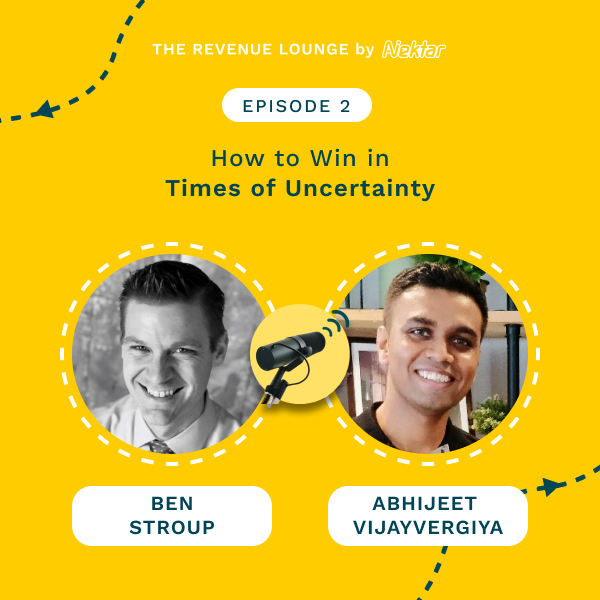
Ep #2: How to Win in Times of Uncertainty
Listen Now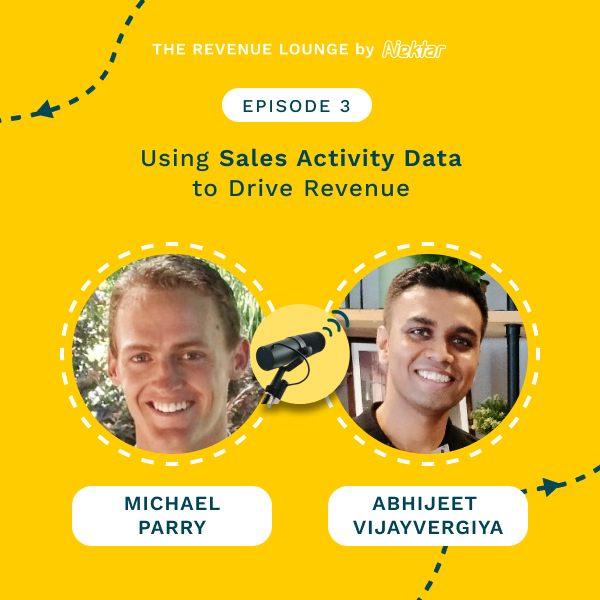
Ep #3: Using Activity Data to Drive Sales Productivity
Listen Now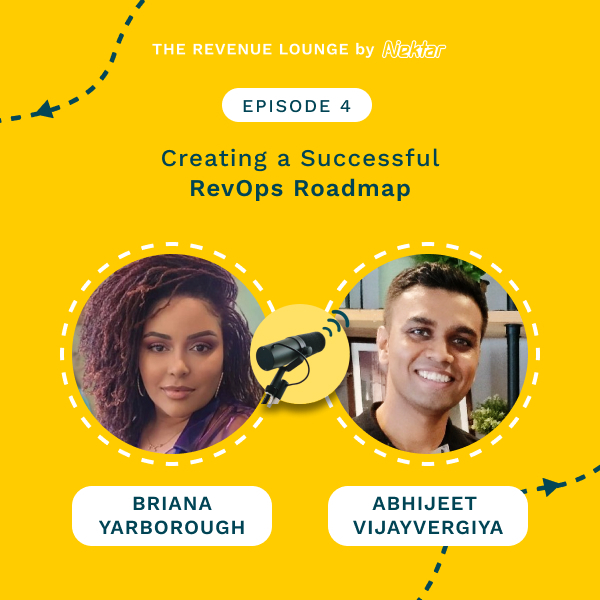
Ep #4: Creating a Successful RevOps Roadmap
Listen Now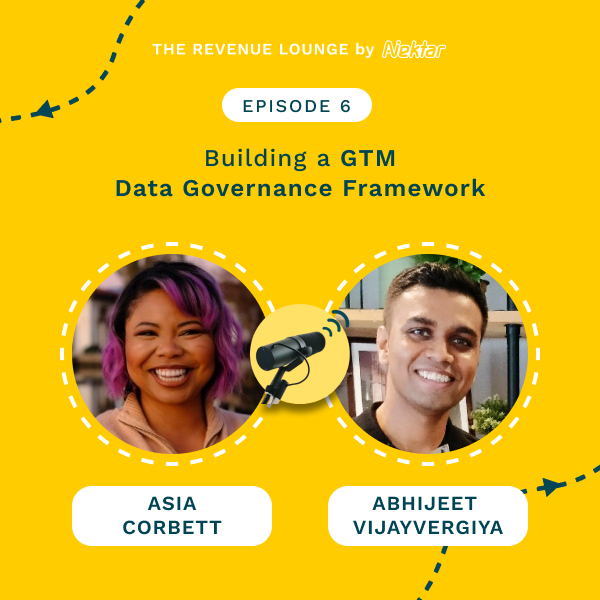
Ep #6: Building a GTM Data Governance Framework
Listen Now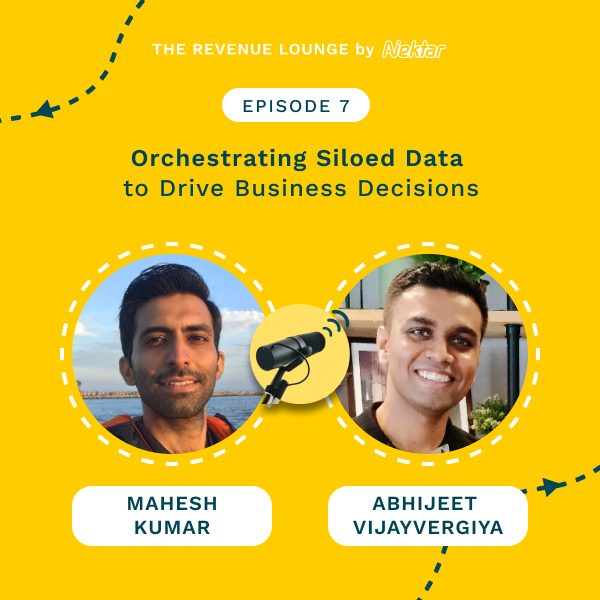
Ep #7: Orchestrating Siloed Data to Drive Business Decisions
Listen Now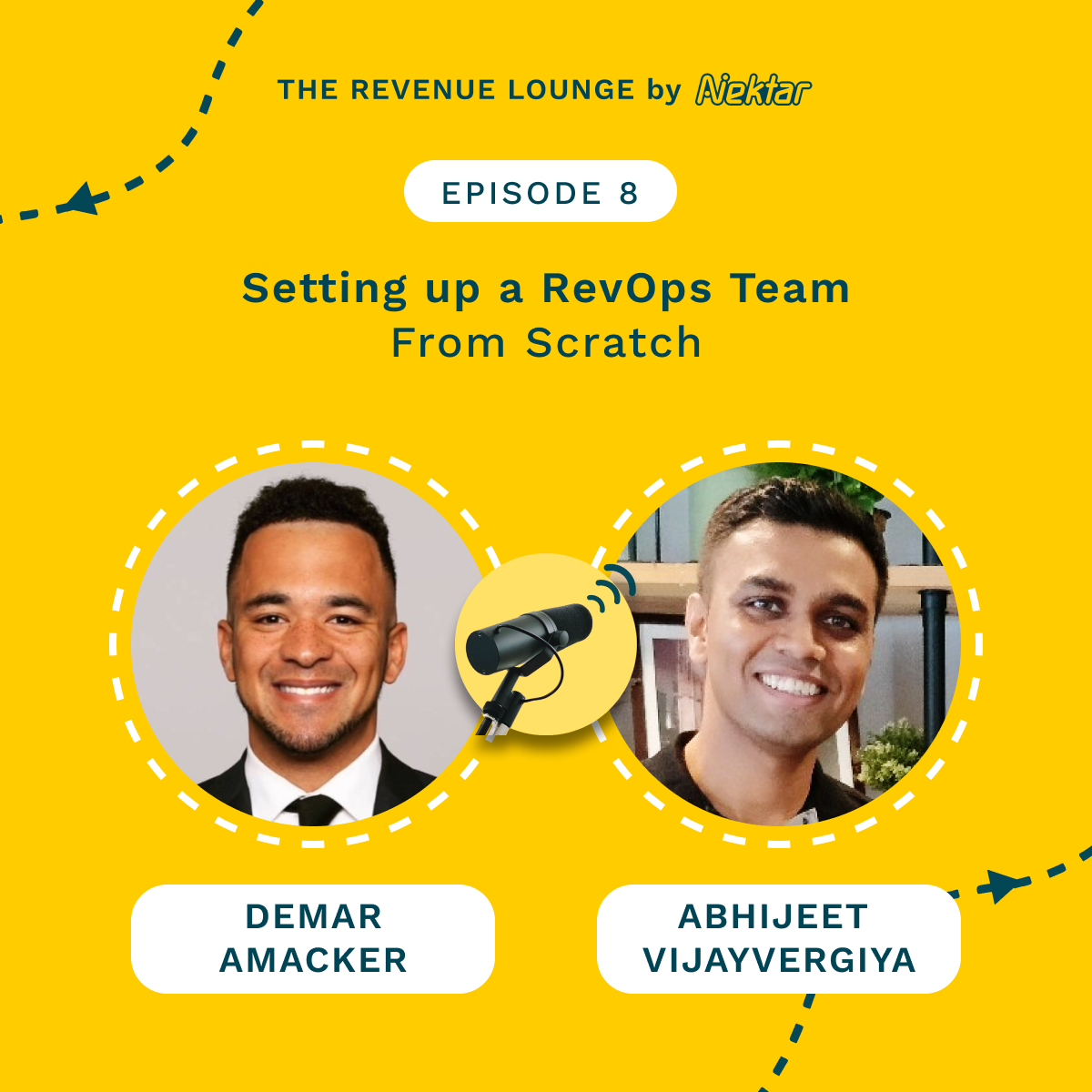
Ep #8: Setting Up a RevOps Team From Scratch
Listen Now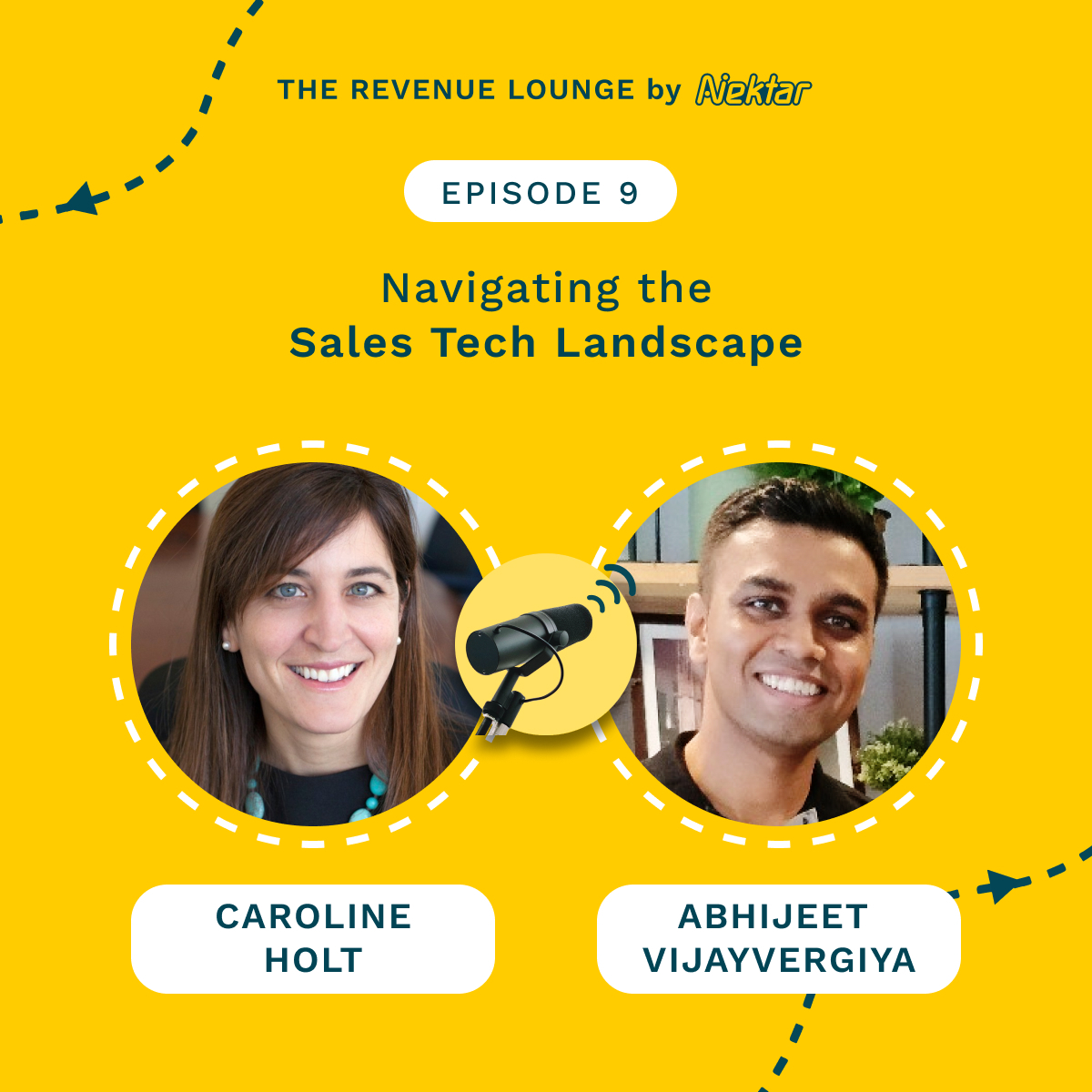
Ep #9: Navigating the Sales Tech Landscape
Listen Now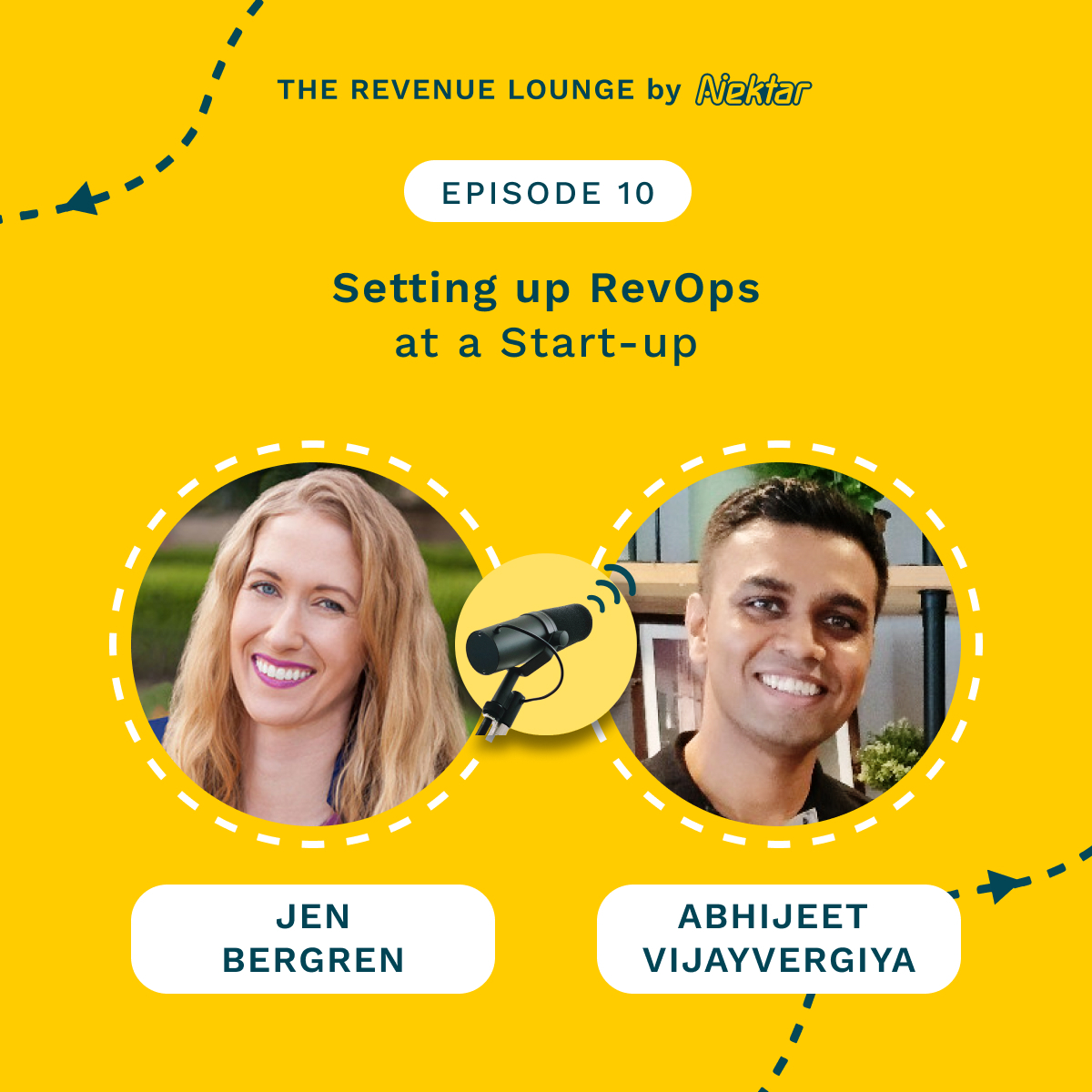
Ep #10: Setting Up RevOps at a Startup
Listen Now